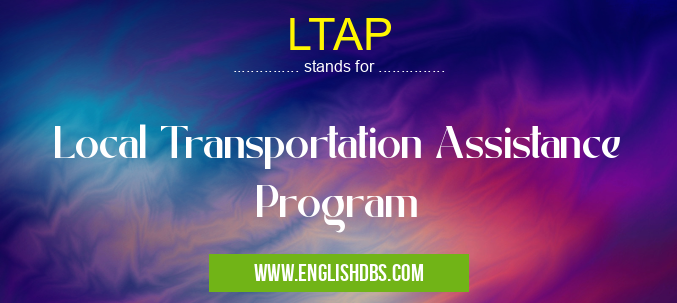What does LTAP mean in TRANSPORTATION
Local Transportation Assistance Program (LTAP) is an innovative program that assists local communities in providing cost-effective and efficient transportation solutions. LTAP provides technical assistance, training, and roadway safety programs to local governments and urban planning organizations. The purpose of this program is to ensure local infrastructure is safe, reliable, and efficient for all users. Through LTAP's support for transportation systems, communities can experience improved air quality, reduced congestion, improved public health outcomes, and enhanced economic growth.

LTAP meaning in Transportation in Governmental
LTAP mostly used in an acronym Transportation in Category Governmental that means Local Transportation Assistance Program
Shorthand: LTAP,
Full Form: Local Transportation Assistance Program
For more information of "Local Transportation Assistance Program", see the section below.
Technical Assistance
LTAP offers a wide range of technical assistance services to help localities implement successful transportation solutions. Their services cover topics such as traffic engineering, safety audits, bridge inspections and maintenance programs. They provide technical assistance in the form of telephone consultations with professional engineers; on-site inspections; technical trainings; research reports; workshops and conferences about roadway design features; access management plans; pavement management plans; pavement marking plans; speed studies; traffic control device plans; bicycle and pedestrian plans; travel demand modeling analysis; public transit assessments; Intelligent Transportation Systems (ITS) analysis; geometric design analysis; crash data analysis; public outreach initiatives such as environmental justice outreach initiatives ;and non-motorized planning projects.
Benefits
The assistance provided by LTAP has many benefits for both local governments and the wider community. By utilizing LTAP services local government can save time and money when undertaking new or existing infrastructure projects while minimizing risk associated with those efforts. Through LTAP's support, localities are able to identify gaps in their infrastructure and create solutions that benefit everyone from motorists to pedestrians. The implementation of these solutions also have positive benefits for the environment by reducing emissions from motor vehicles as well as improving air quality. These improvements also create safer roads for cyclists which encourages more people to get out on a bike instead of relying solely on cars for transport. Overall, LTAP's support leads directly to decreased expenses for maintenance, improved air quality due to reduced emissions from motor vehicles, better public health outcomes due to safer roads for cyclists and pedestrians, increased levels of economic activity because of less congestion along roadways from better planned transport options among other benefits.
Essential Questions and Answers on Local Transportation Assistance Program in "GOVERNMENTAL»TRANSPORTATION"
What is the Local Transportation Assistance Program?
The Local Transportation Assistance Program (LTAP) is a federally funded initiative that provides financial assistance to states and local governments for the purpose of improving public transportation options. This includes grants, technical assistance, training programs, and sharing best practices.
How does LTAP fund projects?
LTAP funds projects through grants and other sources of federal money. These funds are used to support capital investments in public transportation infrastructure, such as buses and rail lines, as well as operations and maintenance costs associated with providing quality service to riders.
Are there eligibility requirements for LTAP funding?
Yes. Grant applicants must demonstrate their ability to meet the program's objective of providing safe, reliable public transportation services in their communities. Applicants must also have sufficient local matching funds available or committed to the proposed project, in addition to experiencing economic or environmental disadvantages that affect their ability to build a robust public transportation system.
What types of projects are eligible for LTAP funding?
Projects eligible for funding include those related to new public transportation construction; transit facility upgrades; vehicle purchases; passenger amenities such as shelters and fare card systems; non-vehicular improvements such as bicycle lanes; roadway improvements that help improve access to transit services; operations and maintenance activities necessary for effective transit operations; and research activities sponsored by transit agencies or universities that promote better understanding of public transportation issues.
Who can apply for an LTAP grant?
Local government entities responsible for planning and operating public transportation services in urbanized areas are eligible applicants under the program. These entities could include state departments of transportation, regional transit authorities, metropolitan planning organizations (MPOs), private non-profit organizations assisting MPOs or transit providers in fulfilling their mission, or certain Indian tribal governments.
How much money is available through LTAP grants?
Funding levels vary depending on the scope of each project proposed by an applicant. Generally speaking, maximum federal shares range from 80 percent up to 100 percent depending on individual circumstances but total award amounts typically do not exceed $5 million per project.
How often do grants become available through LTAP?
Grants become available twice a year - once during the spring cycle and once during the fall cycle - with application deadlines posted on www.ltapgrants info prior to each solicitation period.
How long does it take before I know whether my application has been successful in securing an LTAP grant?
Generally speaking if all required documents are submitted before deadline it can take up to nine months until you receive confirmation that your application has been successful.
Is there any reason why I might be disqualified from applying for an LTAP grant even if my project meets all criteria listed on your website?
Yes — applications will automatically be disqualified if they do not realistically demonstrate how they plan on addressing any concerns regarding fair labor standards act requirements or environmental justice mandates within their region.
Final Words:
In conclusion Local Transportation Assistance Program (LTAP) is a vital source of expertiseand resources availableto assistlocal governmentsin developing sound transportation solutionsfor theirrespectivecommunities that aresafeand cost effectivewhilepromotingeconomicgrowthandenhancedpublichealthoutcomesby creating safespace formotoristscyclistsaswellaspedestrians alike.It is an invaluable serviceprovidingknowledgeableguidanceineverystepofdevelopinginfrastructureprojectsforlocalitiesensuringmaximumbenefitsaregainedfromtheresourcesallocatedtothoseprojects. LTAP provides communities with the tools needed to improve our collective transportation infrastructure leading usall towardsabetterfuture!
